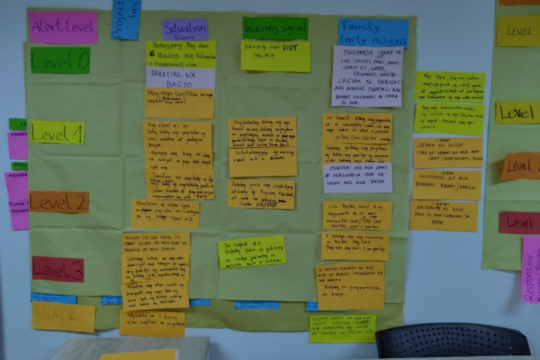On September 26, 2025, the Asian Preparedness Partnership (APP), facilitated an online peer-learning session on Corporate Social Responsibility (CSR) and Disaster Preparedness, bringing together expertise from the Philippines to support Lao PDR in strengthening private sector engagement in building community resilience.
The session was led by Ms. Veronica Gabaldon, Executive Director of the Philippine Disaster Resilience Foundation (PDRF), Ms. Michelle Bayhonan, and Ms. Maria Pamela (Pam) Castro, Senior Program Manager at Pilipinas Shell Foundation, who has more than 35 years of experience in CSR and sustainable development. Eight members of the Lao Disaster Preparedness Partnership (LDPP), including representatives from the Lao National Chamber of Commerce and Industry (LNCCI), actively participated in the exchange. The session built on the momentum of earlier discussions on business continuity planning, furthering APP’s commitment to south-south knowledge exchange.

The meeting began with the introduction of PDRF as a partner in the Philippine Preparedness Partnership (PhilPrep), highlighting its history and achievements as the country’s leading private sector network for resilience.
Acknowledging the vital role of the private sector in advancing both community resilience and national development, Ms. Castro delivered a comprehensive presentation on the concept, evolution, and global frameworks of CSR, including the triple bottom line of profit, people, and planet, and international standards such as ISO 26000 on social responsibility. She defined CSR as “the continuing commitment by businesses to behave ethically and contribute to economic development while improving the quality of life of employees, their families, and the local community.” She underscored the potential of CSR to drive holistic development in the areas where businesses operate, noting that CSR encompasses corporate citizenship, philanthropy, social investment, and community involvement. Ms. Castro emphasized that CSR should be regarded as a long-term investment rather than philanthropy, highlighting its role in proactive preparedness, rapid response, recovery, and rehabilitation. Drawing from Philippine studies, she pointed out that CSR enhances business performance through greater visibility, stronger public trust, and growing recognition of companies’ social initiatives.

Showcasing Philippine practices, Ms. Castro shared how CSR networks—such as the League of Corporate Foundations, the Philippine Business for Social Progress, and PDRF—integrate disaster preparedness and climate resilience into their programs. She demonstrated with regional examples of how various stakeholders in CSR can align themselves towards disaster preparedness. She also underscored how businesses benefit from both financial incentives, such as tax deductions, and non-financial incentives, such as enhanced community trust and improved reputation.

The exchange revealed that while CSR is not new in Lao PDR, it is often expressed in different forms. Members from LNCCI emphasized their readiness to lead discussions among the business community on embedding DRM into CSR initiatives, positioning CSR not only as a driver of responsible business conduct but also as a tool for strengthening community resilience and national development. LDPP members also noted the existence of a Responsible Business Award with accompanying guidelines, though not specific to disaster management. Building on this, participants expressed interest in developing MSME-focused recognition for disaster preparedness and aligning CSR efforts more closely with resilience goals. They also highlighted the International Labour Organization’s (ILO) work on responsible business conduct and the growing Environmental, Social, and Governance (ESG) trend, seeking insights on how disaster preparedness could be integrated into these initiatives.
The session concluded by reaffirming that governments and humanitarian organizations cannot manage large-scale disasters alone. Businesses, guided by global standards and regional experience, can act as lifelines during crises. By embedding CSR into disaster risk reduction, companies not only strengthen community resilience but also enhance their own sustainability and long-term growth.
This initiative is part of APP’s broader effort to strengthen disaster preparedness capacities among National Preparedness Partnership (NPP) members through peer-to-peer learning and regional collaboration.


